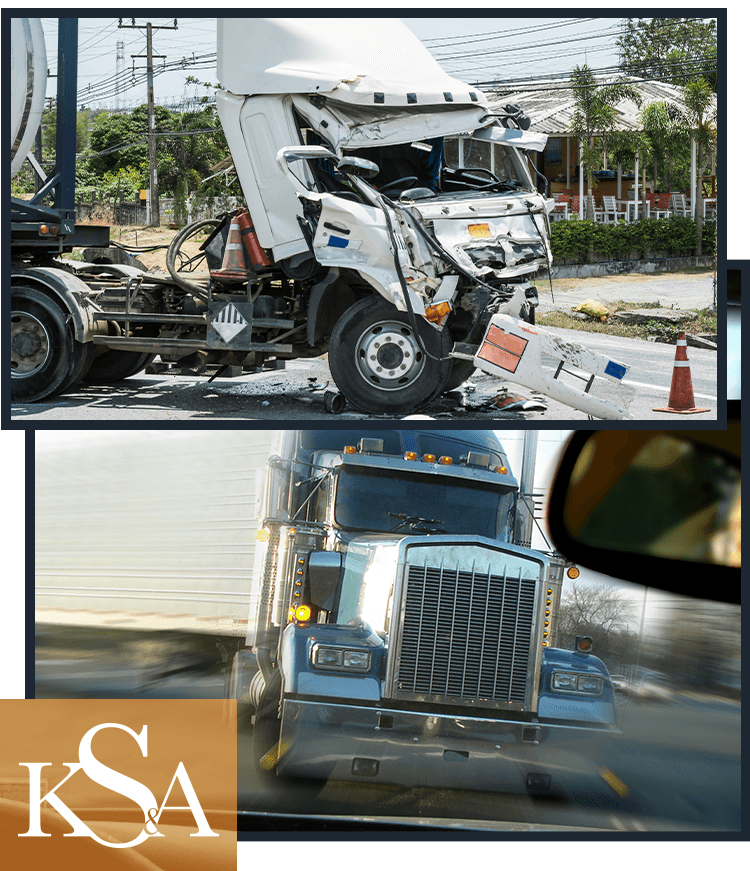
New York City Truck Accident Attorneys
Semi-truck, 18-wheeler & other commercial vehicle accidents
When semi-trucks, 18-wheelers, and other large commercial trucks are involved in accidents with other motor vehicles, the results tend to be devastating. Large truck accidents often lead to catastrophic injuries and fatalities—and the occupants of the smaller passenger vehicles are the ones who usually pay the price.
If you were injured or if your loved one died due to a semi-truck or 18-wheeler collision, the team at Keith D. Silverstein & Associates can help. We firmly believe that you and your family deserve justice, and we are committed to holding negligent truck drivers, trucking companies, and other parties accountable. Our New York City truck accident attorneys are ready to fight for you and every penny you deserve.
What Are the Most Common Types of Truck Accidents?
Here are common types of truck accidents:
- Rear-End Collisions: These occur when a truck collides with the vehicle in front of it. Due to the size and weight of trucks, rear-end collisions can lead to severe damage and injuries.
- Jackknife Accidents: A jackknife accident happens when the trailer of a truck swings out to form a 90-degree angle with the cab. This can occur when the truck skids, and the trailer swings around due to loss of control.
- Underride Accidents: In an underride accident, a smaller vehicle slides underneath the rear or side of a truck, often with catastrophic results. Underride guards are safety features designed to prevent or minimize the severity of underride accidents.
- Override Accidents: The opposite of underride accidents, override accidents occur when a truck runs over a smaller vehicle. This can happen if the truck fails to stop in time and rides over the rear of the smaller vehicle.
- Wide Turns: Trucks, especially those with trailers, require more space to make turns. Accidents can occur when trucks make wide turns, and other vehicles are in the path of the turning truck or trailer.
- Blind Spot Accidents: Trucks have larger blind spots (areas where the driver cannot see other vehicles) compared to smaller vehicles. Accidents can occur when a truck changes lanes or makes a turn without realizing a vehicle is in its blind spot.
- Tire Blowouts: Blowouts of a truck's tires can lead to loss of control, especially at high speeds, resulting in accidents. Poorly maintained tires are a common cause of blowouts.
- Cargo Spills and Rollovers: Improperly loaded or unsecured cargo can lead to spills or cause the truck to tip over, resulting in accidents. Rollover accidents can occur when a truck takes a turn too fast or encounters uneven terrain.
- Brake Failures: Brake failures can be catastrophic for large trucks. Accidents can occur if a truck's brakes malfunction, leading to an inability to stop or slow down in time.
What Are the Most Common Causes of Large Truck Accidents?
Specifically, some of the most common causes of truck accidents include:
- Truck driver error and negligence, including distracted driving, texting while driving, drunk driving, and unsafe or illegal driving maneuvers
- State and federal hours-of-service violations, leading to fatigued or drowsy driving
- Improperly loaded cargo, including overloaded freight or excessive truck weight
- Inadequate truck inspections, maintenance, and repairs
- Truck defects and defective truck parts, such as tires, brakes, reflective strips, lights, and engine components
- Trucking company negligence, such as negligent hiring practices, failure to conduct background checks, failure to discipline drivers, and inadequate training
- Third-party negligence, including distracted and careless driving by other motorists
- Unsafe road conditions, poorly maintained roadways, and defective roadway design
For a free initial consultation, call (646) 813-3922 or contact us online using our secure submission form. Hablamos español.
Who Is Liable for a Commercial Truck Crash?
Under New York’s no-fault insurance system, you could be entitled to financial compensation for certain accident-related damages regardless of fault. However, no-fault insurance—or personal injury protection (PIP)—is limited. It does not cover the full cost of your lost wages, and it only covers medical expenses up to the policy limit. Additionally, PIP does not provide any compensation for non-economic damages, such as pain and suffering.
To secure the full, fair compensation you deserve, you may have to go outside the state’s no-fault system. To do this, you will need to prove that your injury meets the state’s definition of a “serious injury,” and you will have to prove that someone else is legally responsible for causing your injury and its resulting damages.
Liability in a truck accident can be complex and depends on various factors. Different parties may be held liable based on their involvement and responsibility in the incident.
Here are some key parties that could be held liable for a truck accident:
- Truck Driver: The truck driver is often the first party examined for liability. If the accident resulted from the driver's negligence, such as speeding, fatigue, distracted driving, or violation of traffic rules, they may be held liable.
- Trucking Company: The trucking company can be held responsible for the actions of its employees, including the truck driver. If the company failed to properly train or supervise the driver, or if they pressured the driver to violate safety regulations (such as hours-of-service rules), the company might be liable.
- Vehicle Owner: In some cases, the truck involved in the accident may be owned by a party other than the trucking company. If the owner was negligent in maintaining the vehicle or if there were defects that contributed to the accident, the owner may be held liable.
- Truck Maintenance and Repair Entities: Entities responsible for maintaining and repairing the truck can be liable if the accident resulted from poor maintenance or faulty repairs.
- Cargo Loaders: If the accident was caused by improperly loaded or secured cargo, the entities or individuals responsible for loading the cargo may be held liable.
- Manufacturers: If a defect in the truck or its components played a role in the accident, the manufacturer of the defective parts may be held liable for the damages.
- Government Entities: If the accident was caused by poor road conditions, inadequate signage, or other issues related to road maintenance, the government entity responsible for the road may be liable.
- Other Drivers: In some cases, the actions of other drivers on the road may contribute to a truck accident. If another driver's negligence or recklessness played a role, they may be held liable.
Compensation for Truck Accident Victims
Truck accident victims often sustain severe, life-changing injuries, such as traumatic brain injuries, spine injuries, and more. Such injuries often lead to significant physical, emotional, and financial hardships. By filing a personal injury lawsuit, you can seek compensation to assist with the costs of your damages.
Depending on the specific details of your case, you may be entitled to compensation for the following:
- All medical expenses, including future care costs
- Lost wages, income, and future earnings
- Loss of earning ability due to disability or impairment
- Physical and mental pain and suffering
- Rehabilitation and physical therapy
- Mental health treatment
- Diminished quality/enjoyment of life
Why Hire a Truck Accident Attorney?
A truck accident lawyer from Keith D. Silverstein & Associates can help you navigate the aftermath of the accident and fight for the fair settlement you deserve. If the insurance company refuses to play fair, your attorney can represent you and your rights in court.
When you hire our team, you can focus on your physical recovery while we take care of the legal, logistical, and administrative details of your case. We will handle everything so that you can focus on what matters most: healing.
Keith D. Silverstein & Associates offers all legal services on a contingency fee basis. This means that you do not pay any upfront or out-of-pocket attorney fees when you hire our firm. Instead, we only collect legal fees if and when we recover compensation for you.
Contact us today at (646) 813-3922 to schedule a free, no-obligation consultation with one of our New York City truck accident attorneys.
Work With Keith D. Silverstein & Associates
We Help The Injured
"*" indicates required fields
How We Can Help
We Care About Your Healing Our Client's Story
"My husband was injured a few years ago and Keith D. Silverstein & Associates was there to help him receive the compensation he deserved. They worked hard and never settled for anything less than what they thought he was entitled to."
- Virginia
NYC Truck Accident FAQ
What are the unique parts of a truck accident claim compared to a car accident claim?
Truck accident claims are distinct from car accident claims in several ways. First, they typically involve more damage due to the larger size and weight of trucks, resulting in more severe injuries and greater vehicular damage. Second, truck accidents often involve special federal and state regulations that govern the trucking industry, adding a layer of complexity to these cases. Third, different types of evidence may be relevant in a truck accident claim, such as driver logbooks or data from the truck's black box. Lastly, liability can be more complicated in truck accidents as multiple parties could be at fault, including the truck driver, the trucking company, or even the cargo loading company.
What is an electronic on-board recorder?
An Electronic On-Board Recorder (EOBR) is a device used in commercial vehicles, including many trucks and semis, to record the vehicle's movement and driver's activity. It functions similarly to an airplane's black box by recording data like driving time, engine hours, vehicle movement, miles driven, and location information. This technology is primarily used to enforce regulations on Hours of Service (HOS) to prevent driver fatigue but it also serves as valuable evidence in the event of a truck accident, providing crucial data about the truck's operation and the driver's behavior at the time of the collision.
Can I sue the trucking company for my damages and injuries?
You can sue the trucking company for your damages and injuries following a truck accident in many cases. The legal principle of "respondeat superior" can often hold the trucking company liable for the negligent actions of its employees, including truck drivers, when they are acting within the scope of their employment. This can include situations where the truck driver was speeding, driving recklessly, or was otherwise negligent. Additionally, if it can be proven that the trucking company itself was negligent – such as by failing to properly maintain their vehicles, not properly training their drivers, or violating industry regulations – they could also be held directly responsible.
What is the role of federal regulations in a truck accident claim?
Federal regulations play a significant role in a truck accident claim as they set the standards for safety and operation within the trucking industry. These rules, enforced by the Federal Motor Carrier Safety Administration (FMCSA), cover a variety of areas including driver qualifications, hours of service, vehicle maintenance, cargo loading, and more. If a truck driver or trucking company is found to have violated these regulations at the time of an accident, it could be used as evidence of negligence in a lawsuit. For instance, if a driver was operating beyond the federally mandated hours of service and caused an accident, this could significantly affect the outcome of a claim.
What should I do immediately after a truck accident?
Immediately after a truck accident, your priority should be safety and medical attention. If possible, move to a safe location away from traffic and call 911. Even if you don't feel injured, it's crucial to seek medical attention as some injuries may not be immediately apparent. Report the accident to law enforcement and cooperate with them, providing an accurate account of the incident. Document the scene by taking pictures or videos if you can do so safely. Gather information such as the truck driver's name, contact details, license number, insurance info, the trucking company's name, and any trailer ID numbers you can see. Try to collect contact information from any witnesses. It's important not to admit fault or discuss the accident with the truck driver or their employer. Finally, contact a lawyer who specializes in truck accidents, as they can guide you through the process of filing a claim while protecting your rights.
What do I do if the truck driver was an independent contractor?
If the truck driver who hit you was an independent contractor, you can still file a lawsuit against them for your damages and injuries. However, the process may be slightly different compared to when the driver is an employee of a trucking company. In this case, the driver themselves would typically be held liable rather than the company they were contracted by. You would need to prove that the driver was negligent and that their negligence directly caused the accident and your injuries. It's also possible that the company contracting the driver could be held partially liable, for instance, if they were negligent in hiring an unqualified or unsafe driver.
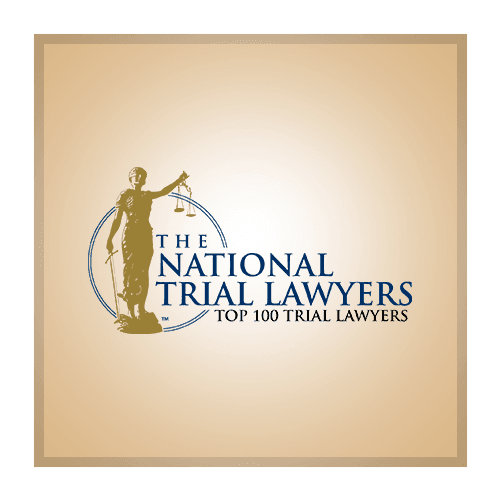
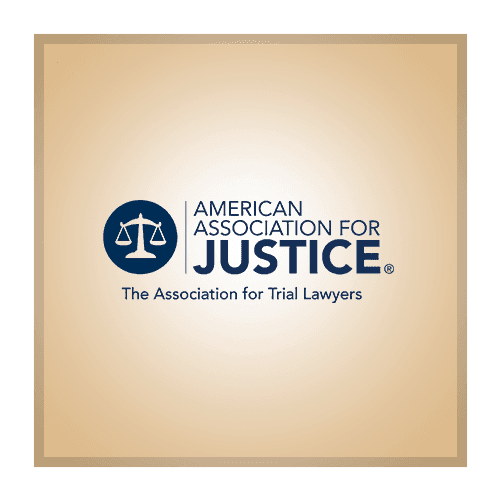


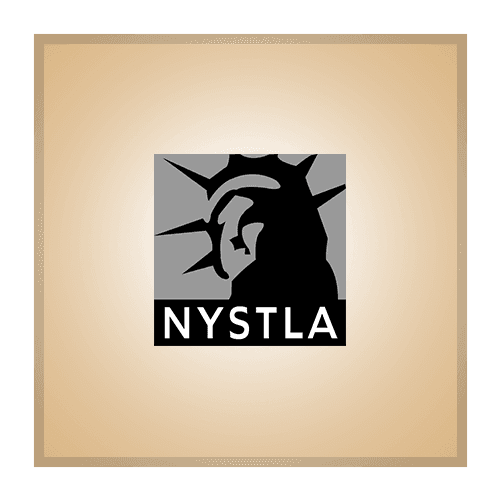
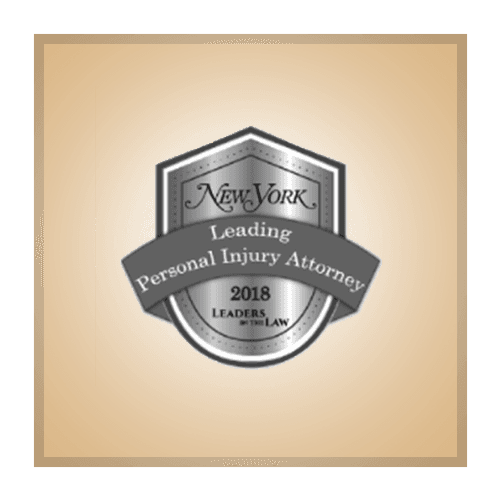
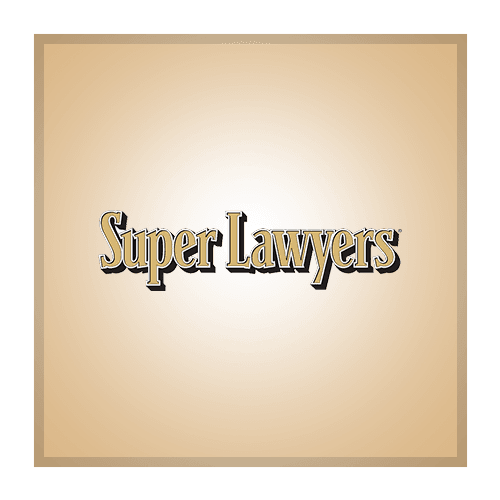
Get a Free Consultation Contact Us Today
Let our team protect your rights
"*" indicates required fields

